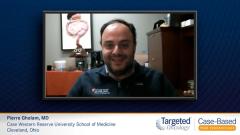
Unresectable HCC: Key Treatment Considerations
A key opinion leader shares clinical practice pearls for the treatment of patients with unresectable HCC.
Episodes in this series

Pierre Gholam, MD: One can conclude that patients with unresectable HCC [hepatocellular carcinoma] continue to face fairly daunting prospects in terms of prognosis, but their ability to navigate more than 1 treatment, certainly multiple treatments, both in the first line and in subsequent lines, has improved dramatically. I think that is an optimistic, positive message we should be conveying to our patients, which is far more than I could say to a patient even a decade ago. It is very important to determine that the disease indeed is unresectable beyond any shadow of a doubt, because let’s remember that about 25% to 30% of patients in the West, and probably an even higher proportion of our patients treated in Asia and other places, are actually resectable or curable. But once that has been established, then I think an in-depth discussion of the risks, benefits and alternatives to any proposed treatment should be had. In the first line, I’ll remind the audience that the 3 treatments endorsed by the NCCN [National Comprehensive Cancer Network]—1 preferred and 2 available for use—are atezolizumab and bevacizumab for Child-Pugh A, lenvatinib for Child-Pugh A, and sorafenib potentially for Child-Pugh A and a subset of Child-Pugh B patients.
Those are 3 options that all have liabilities and advantages; mode of administration, intravenous versus oral; specific [adverse] effects, including mitigation of risk of bleeding in the setting of the combination; hypertension; hand-foot skin reaction; and the slew of potential adverse events that come with the administration of TKIs [tyrosine kinase inhibitors]. All of these are factors worth discussing with patients, along with the very important determination of what the overall survival might look like in that particular patient. All patients are specifically interested in knowing how long they’re going to live if they pursue a specific therapy. I think a discussion of quality of life, which we’re starting to get data on for all these agents, is critically important too.
[Finally] a discussion of the variation on how all of these may shape up in someone who has more advanced liver disease, specifically Child-Pugh B, is very important. I’m thinking of some of the recent data we talked about with lenvatinib in Child-Pugh B and some of the existing data we have in the setting of sorafenib in Child-Pugh B from a number of sources, including a large case series published almost 10 years ago, and the GIDEON [study] database, which was a very large database of patients who received sorafenib in the real world. All of these are important discussions to have with the patient and any caregivers or supports. Of course, it is important to mention we have several agents that are FDA-approved in the second line, so that if patients fail therapy or progress on any of these therapies, there are potentially 1, even 2 lines of therapy that may be available to them beyond that.
Transcript edited for clarity.
A 61-Year-Old Woman with Hepatocellular Carcinoma
Initial Presentation
- A 61-year-old woman complains of fatigue, RUQ pain and nausea and vomiting
- PMH: medically controlled hypertension; obesity; diabetes managed with oral medication
- PE: hepatomegaly with tenderness over the RUQ
Clinical Workup
- CT scan of chest, abdomen and pelvis, with 4 phase liver evaluation: 4.0-cm hepatic mass in the right hepatic lobe
- Labs: AFP: 1.5 ng/dL; Alb: 3.9 g/dL; INR: 1.45; Bili: 1.1 mg/dL , HbA1c: 7.0; platelet count 90,000
- Biopsy of the lung metastasis demonstrated evident hepatocellular carcinoma
- Child-Pugh A
- ECOG PS 1
Treatment
- Initiated lenvatinib 12 mg QD

















